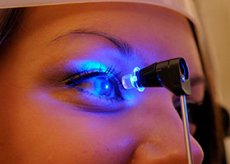New publications
Taking birth control can lead to blindness
Last reviewed: 02.07.2025

All iLive content is medically reviewed or fact checked to ensure as much factual accuracy as possible.
We have strict sourcing guidelines and only link to reputable media sites, academic research institutions and, whenever possible, medically peer reviewed studies. Note that the numbers in parentheses ([1], [2], etc.) are clickable links to these studies.
If you feel that any of our content is inaccurate, out-of-date, or otherwise questionable, please select it and press Ctrl + Enter.

Scientists have traced an unpleasant trend: women who take contraceptives for a long time – more than three years – are twice as likely to develop chronic vision disorders, including complete vision loss.
First of all, such women are often affected by glaucoma - a dangerous eye disease that leads to irreversible consequences. Glaucoma develops with functional blockage of intraocular drainage canals: the fluid outflow slows down, intraocular pressure increases - and, as a result, the retina and optic nerve are damaged and destroyed.
Thanks to a new study, scientists have for the first time been able to detect an increased risk of developing this disease in patients who have used oral contraceptives for a long time. Starting today, specialists have the right to require gynecological and ophthalmological doctors to warn women about the possible increased risk of developing glaucoma while taking birth control pills.
Glaucoma prevention is incredibly important, as the damage caused by this insidious disease cannot be restored - only in some cases, with early medical help, doctors manage to stop the progression of the pathology. However, unfortunately, glaucoma is increasingly diagnosed at the late stages of the disease.
According to statistics, more than sixty million people on the planet suffer from glaucoma (the average age of patients is 40-80 years). The forecasts are also disappointing: it is assumed that in 2020 the number of glaucoma patients will approach 76 million, and in 2040 the number of patients will increase to 112 million.
Professor Shan Lina, a representative of the University of California, San Francisco, together with his team, carefully analyzed the medical information of almost 3.5 thousand patients with an average age of about 40. The study was conducted in the United States between 2005 and 2008.
It was found that those participants in the experiment who took one or another oral contraceptive for 3-4 years or more were subsequently twice as likely to be diagnosed with glaucoma.
Experts have not been able to unravel and establish a direct cause-and-effect relationship between the use of oral contraceptives and the development of glaucoma. It follows that long-term use of such drugs can be considered a probable risk factor.
Previous research projects have already provided ample evidence that one of the most important female hormones, estrogen, can influence visual function and the development of glaucoma – a fact that can be used to some extent to explain the findings of the latest study.
The results of the work were presented at the 117th annual conference of the American Academy of Ophthalmology (New Orleans), and also presented on the Academy’s website – aao.org.

 [
[